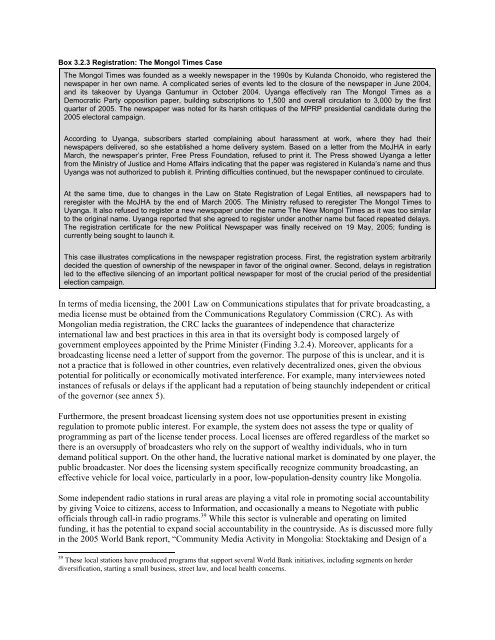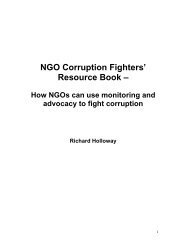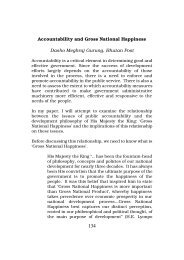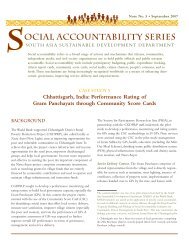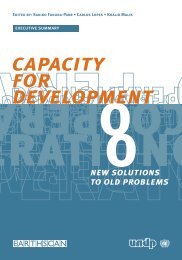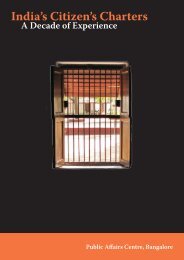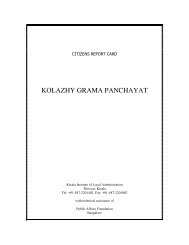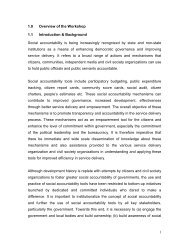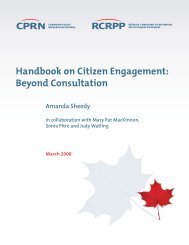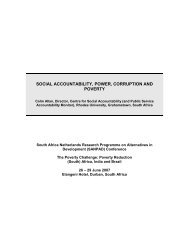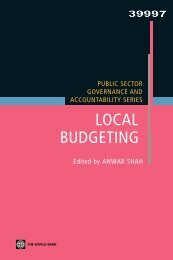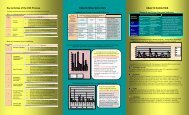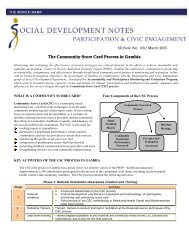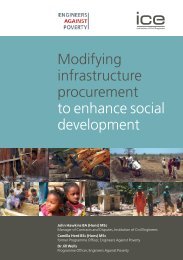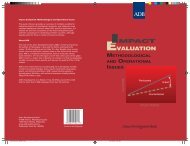Enabling Environment for Social Accountability in ... - SASANet
Enabling Environment for Social Accountability in ... - SASANet
Enabling Environment for Social Accountability in ... - SASANet
You also want an ePaper? Increase the reach of your titles
YUMPU automatically turns print PDFs into web optimized ePapers that Google loves.
Box 3.2.3 Registration: The Mongol Times Case<br />
The Mongol Times was founded as a weekly newspaper <strong>in</strong> the 1990s by Kulanda Chonoido, who registered the<br />
newspaper <strong>in</strong> her own name. A complicated series of events led to the closure of the newspaper <strong>in</strong> June 2004,<br />
and its takeover by Uyanga Gantumur <strong>in</strong> October 2004. Uyanga effectively ran The Mongol Times as a<br />
Democratic Party opposition paper, build<strong>in</strong>g subscriptions to 1,500 and overall circulation to 3,000 by the first<br />
quarter of 2005. The newspaper was noted <strong>for</strong> its harsh critiques of the MPRP presidential candidate dur<strong>in</strong>g the<br />
2005 electoral campaign.<br />
Accord<strong>in</strong>g to Uyanga, subscribers started compla<strong>in</strong><strong>in</strong>g about harassment at work, where they had their<br />
newspapers delivered, so she established a home delivery system. Based on a letter from the MoJHA <strong>in</strong> early<br />
March, the newspaper’s pr<strong>in</strong>ter, Free Press Foundation, refused to pr<strong>in</strong>t it. The Press showed Uyanga a letter<br />
from the M<strong>in</strong>istry of Justice and Home Affairs <strong>in</strong>dicat<strong>in</strong>g that the paper was registered <strong>in</strong> Kulanda’s name and thus<br />
Uyanga was not authorized to publish it. Pr<strong>in</strong>t<strong>in</strong>g difficulties cont<strong>in</strong>ued, but the newspaper cont<strong>in</strong>ued to circulate.<br />
At the same time, due to changes <strong>in</strong> the Law on State Registration of Legal Entities, all newspapers had to<br />
reregister with the MoJHA by the end of March 2005. The M<strong>in</strong>istry refused to reregister The Mongol Times to<br />
Uyanga. It also refused to register a new newspaper under the name The New Mongol Times as it was too similar<br />
to the orig<strong>in</strong>al name. Uyanga reported that she agreed to register under another name but faced repeated delays.<br />
The registration certificate <strong>for</strong> the new Political Newspaper was f<strong>in</strong>ally received on 19 May, 2005; fund<strong>in</strong>g is<br />
currently be<strong>in</strong>g sought to launch it.<br />
This case illustrates complications <strong>in</strong> the newspaper registration process. First, the registration system arbitrarily<br />
decided the question of ownership of the newspaper <strong>in</strong> favor of the orig<strong>in</strong>al owner. Second, delays <strong>in</strong> registration<br />
led to the effective silenc<strong>in</strong>g of an important political newspaper <strong>for</strong> most of the crucial period of the presidential<br />
election campaign.<br />
In terms of media licens<strong>in</strong>g, the 2001 Law on Communications stipulates that <strong>for</strong> private broadcast<strong>in</strong>g, a<br />
media license must be obta<strong>in</strong>ed from the Communications Regulatory Commission (CRC). As with<br />
Mongolian media registration, the CRC lacks the guarantees of <strong>in</strong>dependence that characterize<br />
<strong>in</strong>ternational law and best practices <strong>in</strong> this area <strong>in</strong> that its oversight body is composed largely of<br />
government employees appo<strong>in</strong>ted by the Prime M<strong>in</strong>ister (F<strong>in</strong>d<strong>in</strong>g 3.2.4). Moreover, applicants <strong>for</strong> a<br />
broadcast<strong>in</strong>g license need a letter of support from the governor. The purpose of this is unclear, and it is<br />
not a practice that is followed <strong>in</strong> other countries, even relatively decentralized ones, given the obvious<br />
potential <strong>for</strong> politically or economically motivated <strong>in</strong>terference. For example, many <strong>in</strong>terviewees noted<br />
<strong>in</strong>stances of refusals or delays if the applicant had a reputation of be<strong>in</strong>g staunchly <strong>in</strong>dependent or critical<br />
of the governor (see annex 5).<br />
Furthermore, the present broadcast licens<strong>in</strong>g system does not use opportunities present <strong>in</strong> exist<strong>in</strong>g<br />
regulation to promote public <strong>in</strong>terest. For example, the system does not assess the type or quality of<br />
programm<strong>in</strong>g as part of the license tender process. Local licenses are offered regardless of the market so<br />
there is an oversupply of broadcasters who rely on the support of wealthy <strong>in</strong>dividuals, who <strong>in</strong> turn<br />
demand political support. On the other hand, the lucrative national market is dom<strong>in</strong>ated by one player, the<br />
public broadcaster. Nor does the licens<strong>in</strong>g system specifically recognize community broadcast<strong>in</strong>g, an<br />
effective vehicle <strong>for</strong> local voice, particularly <strong>in</strong> a poor, low-population-density country like Mongolia.<br />
Some <strong>in</strong>dependent radio stations <strong>in</strong> rural areas are play<strong>in</strong>g a vital role <strong>in</strong> promot<strong>in</strong>g social accountability<br />
by giv<strong>in</strong>g Voice to citizens, access to In<strong>for</strong>mation, and occasionally a means to Negotiate with public<br />
officials through call-<strong>in</strong> radio programs. 39 While this sector is vulnerable and operat<strong>in</strong>g on limited<br />
fund<strong>in</strong>g, it has the potential to expand social accountability <strong>in</strong> the countryside. As is discussed more fully<br />
<strong>in</strong> the 2005 World Bank report, “Community Media Activity <strong>in</strong> Mongolia: Stocktak<strong>in</strong>g and Design of a<br />
39 These local stations have produced programs that support several World Bank <strong>in</strong>itiatives, <strong>in</strong>clud<strong>in</strong>g segments on herder<br />
diversification, start<strong>in</strong>g a small bus<strong>in</strong>ess, street law, and local health concerns.


